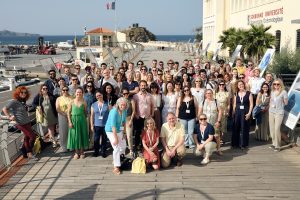

9 January 2026
We launched our Sustainability Initiative to encourage and support ideas that enable biologists to collaborate productively whilst minimising their impact on the environment. We are proud that our grants have supported hundreds of events so far, connecting biologists from all around the world with a lower impact on the environment.
One of the most sustainable actions you can take for your event is to organise it entirely remotely. In this blog, we interviewed Drenka Trivanovic, Organising Committee Chair of The Bone Marrow Adiposity Society (BMAS) 2025 Virtual Summer School, who remotely organised the event with support from our Fund for Innovations in Sustainable Conferencing. This event successfully brought people together while reducing CO₂ emissions and costs. Drenka shared her experience with us. …
9 December 2025
As this year wraps up, The Company of Biologists celebrates 100 years of publishing. Looking back at all the biologists whose careers we have influenced and the science that we have helped advance, we cannot help but feel delighted at the impact we have made in the communities that we serve. As we reminisce about the past, one thing becomes clear: none of this would have been possible without our inspiring and motivated staff. …
27 October 2025
By Liew Yao Rong
We are delighted to present to you the first prize-winning essay by Liew Yao Rong (Taylor University) from our essay competition, ‘Innovative ideas for the future of sustainable events’. We received a high number of thoughtful and innovative essays, and while it was a tough decision for our Sustainability Board to make, this essay stands out. Here is Liew Yao Rong’s innovative idea that could make the events of the future more sustainable: …
16 September 2025
by Saurabh Chand Sagar
My name is Saurabh Chand Sagar and I am a Drosophila cell and developmental biologist currently undertaking my doctoral studies at Banaras Hindu University, India. As an attendee of the Biologists @ 100 conference, I enjoyed the seamless integration of cellular science with its repercussions on physiological processes and behavioural patterns, further exploring these effects on climate change and biodiversity conservation. The Company of Biologists demonstrated its commitment to sustainability by minimising environmental impact through eco-friendly practices at the conference. …
5 September 2025

10 December 2025
By Katherine Paine
We are delighted to present to you the third prize-winning essay by Katherine Paine (University of Edinburgh) from our essay competition, ‘Innovative ideas for the future of sustainable events’. We received a high number of thoughtful and innovative essays, and while it was a tough decision for our Sustainability Board to make, this essay stands out. Here is Katherine Paine’s innovative idea that could make the events of the future more sustainable: …
21 November 2025
By Tan Hooi Wen
We are delighted to present to you the second prize-winning essay by Tan Hooi Wen (Taylor University) from our essay competition, ‘Innovative ideas for the future of sustainable events’. We received a high number of thoughtful and innovative essays, and while it was a tough decision for our Sustainability Board to make, this essay stands out. Here is Tan Hooi Wen’s innovative idea that could make the events of the future more sustainable: …
13 October 2025
As a company, we are committed to ensuring that sustainability is a consideration in everything we do. When organising our Workshops, we are always looking for new ways to minimise our environmental impact. Sustainable events require a well-thought-out strategy and collaboration with the right stakeholders. We actively seek partnerships with suppliers that we can work with to deliberately choose sustainable options and to ensure that services and products meet our sustainable goals. This isn’t always a straightforward process. It requires constant searches for criteria matching, data analysis, grading and a fair amount of trial and error.
8 September 2025
by Léa Manke
My journey to the Biologists @ 100 conference began early on Saturday morning. Clutching my thermos filled with coffee, I made my way to the major train station in Paris, France, Gare du Nord. A light drizzle was falling on the city, turning Paris into a shiny mirror of lights while the sun was slowly rising. Arriving at the station, I saw the first cafes and brasseries opening while the waiters were urging the customers to place their orders. I arrived with enough time to buy myself a hot croissant and continue to passport control. Once passed, I comfortably settled in the waiting area munching my breakfast and reading my crime novel. Time went by in a blink and my train to London St. Pancras, UK, was called out ready for boarding. As I got on the Eurostar, the realisation settled in that in less than 3 hours, I would arrive in one of my favourite cities in Europe. …
26 August 2025
By Ankita Thawani, Travelling Fellowship (Development) recipient

Ever wonder how you can follow the smell of fresh pastries to the break room, dodge a ball flying at your face or get a reflexive jump scare when your friend yells “Boo!”? The answer lies between your ears, literally! …
You must be logged in to post a comment.